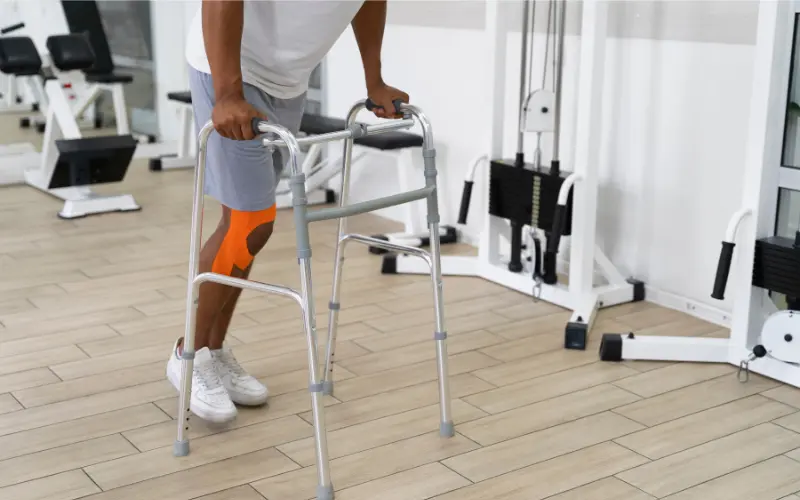Knee Replacement in Chandigarh: 6 Things Most Patients Miss!

Imagine waking up every morning dreading that first step out of bed. Your knee stiffens, pain shoots through your leg, and suddenly even simple things like climbing stairs or getting out of a car feel like Olympic-level challenges.
If you’ve been living with chronic knee pain, you’ve probably heard someone say, “Maybe it’s time for a knee replacement.” But that’s a big decision, right?
Here’s the problem. Most patients walk into surgery only half-informed.
They miss key details that can affect not just their recovery but their entire experience.
Whether you’re just exploring options or have already spoken to a surgeon, this guide will uncover the six most overlooked things about getting a knee replacement in Chandigarh. We’ll cover surgery types, recovery timelines, risks, costs, and how actually to find the right hospital.
And if you’re serious about doing it right, Eden Critical Care Hospital is one of Chandigarh’s trusted choices. Patients come here not just for expert surgery but for honest answers and real support every step of the way. Let’s get into it.
Is It Time for a Knee Replacement?

It’s one of the most common questions I get: “How do I know if it’s really time for surgery?”
The truth is, knee replacement is never the first step. Most doctors will recommend other treatments first, like medications, physiotherapy, weight loss, or even joint injections. And many people do see some relief from these.
But here’s when a knee replacement starts to make sense:
- You’re in pain every single day, even while resting
- Walking, bending, or climbing stairs has become extremely difficult
- Painkillers and therapy are no longer helping
- Your knee looks swollen or deformed
- Pain is affecting your sleep, mood, or ability to stay independent
If most of those sound familiar, your knee joint is likely severely damaged. The most common causes are osteoarthritis, rheumatoid arthritis, or past injuries.
Doctors will usually confirm this through X-rays, MRIs, and some movement tests. At Eden Critical Care Hospital, we don’t recommend surgery unless it’s truly needed. We start by exploring all non-surgical options and only move to surgery when it offers the best chance of long-term relief.
So don’t think of knee replacement as giving up. Think of it as taking control and getting your life back.
Types of Knee Replacements — Which One Do You Need?

Not all knee surgeries are the same. The type of knee replacement you need depends on the damage inside your joint, your age, lifestyle, and overall health.
Let’s break down the main types so you can understand what might be right for you:
1. Total Knee Replacement (TKR)
This is the most common type. In TKR, the damaged parts of your knee joint are replaced with metal and plastic implants. It’s usually recommended when both sides of the knee are affected. It gives excellent long-term results and can last 15 to 20 years or more with proper care.
2. Partial Knee Replacement (PKR)
In this surgery, only the damaged part of the knee is replaced. It’s a less invasive option, and the recovery is often quicker.
However, not everyone qualifies. It only works if the damage is limited to one section of the knee.
3. Bilateral Knee Replacement
This means both knees are replaced during the same operation. It’s usually done for people with severe arthritis in both knees and who are fit enough to recover from a longer surgery.
4. Advanced Options (Including Robotic-Assisted Surgery)
Some hospitals offer advanced surgical techniques such as computer-assisted or robotic knee replacement. These can improve accuracy, reduce blood loss, and may speed up recovery. Your surgeon will decide if it’s suitable for your case.
Each option comes with its own pros and cons. That’s why a detailed discussion with your orthopedic surgeon is important. They’ll assess your condition, explain the risks, and recommend the type of surgery that fits you best.
What Actually Happens During the Surgery

Let’s clear the mystery around the operation itself. Most people are nervous because they don’t know what to expect. So here’s a simple, step-by-step overview of what really happens during a knee replacement procedure.
1. Before the Surgery: Preparing Your Body
Your medical team will run a few essential checks to make sure everything is good to go.
- Blood tests, X-rays, and sometimes MRIs are done
- Your heart and lungs are checked for surgery readiness
- You’ll be told when to stop eating or drinking
- Medications may be adjusted or paused
2. During the Surgery: Replacing the Joint
The actual procedure is more routine than you might think.
- You’ll receive anesthesia (either spinal or general)
- The surgeon makes a small incision around the knee
- Damaged bone and cartilage are removed
- Artificial components (metal and plastic) are inserted and fixed in place
- Surgery usually takes 1 to 2 hours
3. Right After Surgery: Recovery Starts Immediately
Recovery begins sooner than most people expect.
- You’ll be monitored in a recovery area for a few hours
- Pain management is started immediately
- You’ll likely be asked to move your leg the same or the next day
- A physiotherapist will guide you through basic movements
- Hospital stay is usually 2 to 4 days
Recovery Timeline

You’ve had the surgery. Now what? Recovery is where the real transformation begins. It’s not always quick, and it’s definitely not the same for everyone. But knowing what to expect makes all the difference.
Here’s a general timeline to help you understand how recovery unfolds:
Week 1: Getting Back on Your Feet
Yes, you’ll likely be walking (with support) within a day or two.
- Pain and swelling are normal, but manageable with medication
- A physiotherapist will help you start simple leg movements
- Walking aids like walkers or crutches will be used
- You’ll be encouraged to sit, stand, and walk short distances
Week 2 to Week 6: Gaining Confidence and Strength
This is when you slowly return to normal activities.
- Swelling starts to reduce
- You’ll move from a walker to a stick or walking without support
- Daily physiotherapy exercises become a routine
- You’ll work on bending your knee and strengthening your thigh muscles
Week 6 to Month 3: Getting Your Life Back
Mobility improves, and your knee starts to feel more stable.
- Many patients resume light work or drive short distances
- You can walk longer without discomfort
- Exercises to improve endurance and joint flexibility
- Occasional soreness is common, especially in the evenings
Months 3 to 12: Long-Term Recovery and Real Results
This is where the full benefits show up.
- You may forget you even had surgery
- Climbing stairs, walking long distances, and standing for long periods become easier
- Most people return to hobbies, travel, and even mild sports
- Annual check-ups ensure your implant stays in great shape
Everybody is Different
Recovery timelines vary. Age, weight, health conditions, and how closely you follow rehab instructions all play a role. Some people recover fast. Others take more time. And that’s completely normal.
Patience and consistency matter more than speed.
Is It Safe? What Are the Risks?

Let’s be real, the idea of surgery is scary for most people. You hear words like “operation” and “implant,” and suddenly your brain is racing with worst-case scenarios. Totally normal.
But here’s what you need to know: Knee replacement is one of the most successful surgeries in the world.
Tens of thousands of people walk into hospitals with pain and walk out literally with a new lease on life. That said, no surgery is 100% risk-free. Let’s break it down.
What Can Go Wrong? (But Rarely Does)
Most surgeries go smoothly. But like any medical procedure, there are a few risks:
- Infection at the surgery site
- Blood clots in the legs or lungs
- Stiffness in the knee if you skip exercises
- The implant is becoming loose after many years
- Nerve pain or numbness, usually for a short time
These are not common, and doctors know how to prevent or treat them quickly.
What Happens Most of the Time?
Most people feel a big difference after knee replacement.
- Pain becomes much less within a few weeks
- Walking and daily activities get easier
- You can sleep and move better
- The new knee joint can last 15 to 20 years, or even more
What Can You Do to Stay Safe and Recover Well?
You play a big role in your recovery, too. Here’s how to help your body heal:
- Do your physiotherapy every day
- Eat healthy food, especially proteins
- Keep your knee clean and dry
- Go for regular checkups
- Tell your doctor if something feels wrong
In short, yes, knee replacement is safe for most people. And with the right care, it can change your life for the better.
Why Eden Critical Care Hospital Is a Trusted Choice for Knee Replacement in Chandigarh
When it comes to knee replacement, not every hospital offers the same level of care, safety, and support.
At Eden Critical Care Hospital, we focus on making your entire journey from your first consultation to full recovery as smooth, safe, and stress-free as possible.
Here’s what makes Eden a reliable choice for patients across Chandigarh and beyond:
- Experienced surgeons with high success rates
- Modern, fully equipped operating theatres
- Personalized physiotherapy and rehab plans
- Full support before and after surgery
- Help with insurance, billing, and EMI options
- Strong track record of happy, pain-free patients
Frequently Asked Questions
1. Can I walk immediately after the surgery?
Yes, most patients are encouraged to stand or take a few steps (with support) within 24 hours after surgery.
2. Will I be able to climb stairs after recovery?
Absolutely. Once your knee heals and you regain strength, climbing stairs becomes much easier than before surgery.
3. How long will the implant last?
Modern implants can last 15 to 20 years or even longer with proper care and regular check-ups.
4. What if I’m overweight or diabetic?
You can still have knee replacement surgery. Your doctor will take extra precautions to manage your overall health and recovery.
5. Is there a lot of pain after surgery?
Some pain is normal, especially in the first few days. But it’s well managed with medicines and gets better quickly with physiotherapy.
6. When can I drive again?
Most people can return to driving within 4 to 6 weeks, once they’re able to control the leg comfortably and safely.
7. Will the new knee feel completely normal?
It may feel slightly different from your natural knee, but most patients report major relief from pain and improved movement.
Conclusion:
Living with knee pain every day is more than just uncomfortable. It slowly affects your mood, your confidence, and your ability to enjoy life. You may start avoiding stairs, skipping outings, or depending on painkillers just to get through the day. But there is a better way.
Knee replacement is a safe and proven treatment that has helped thousands of people walk, move, and live better again. If you’re in Chandigarh, expert care is closer than you think.
At Eden Critical Care Hospital, our focus is not just on surgery. We focus on giving you a smooth recovery, better movement, and a fresh start. Ready to take the first step toward a pain-free life? Book your consultation today and let us help you make the right choice for your health.
